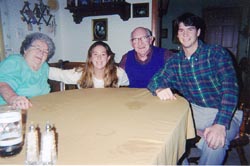
by Kristin Hagert
20th Century Christmas Memories
The holidays are not only time to get together and begin new stories but also to become closer by reminiscing about old memories.
"This holiday season, New Bay Times will be sharing favorite holiday stories," we advertised in the months before Christmas. "We'd like your story to be among them "
A dozen Chesapeake Country readers and writers answered our call. Add their stories to yours, and our shared stories fit together like puzzle pieces revealing who in this spinning, changing world we are ...
Family Traditions ~
After Dinner, We Serve Dessert and Legends
by Kristin Hagert
Kristin Hagert and brother Chris with grandparents Emily & Edward Hagert.
At holiday dinners when I was a little girl, the scene was always the same. Grandma and Grandpa sat at either end of the cherry-stained oak table. Mom and Dad were on the left side of the table mirroring Uncle Allen and Aunt Diane. Scattered between the adults were me, my brother Chris and our cousins, Eric and David. The large oval table separated and connected us at the same time.
I tried to get away from the table as soon as possible. Those dinners were filled with family stories that I didn't understand or want to hear. But the enormous meal always kept me at the table. "You're not going anywhere until your plate is licked clean," my father would tease.
Soon I figured out a strategy for record-setting eating. The peas and mashed potatoes, dripping with gravy, slid easily down my throat. The turkey, cut into large triangles, were popped, like popcorn, into my mouth.
Molly, our Lhasa apso and now 13-year table scrap veteran, helped out by catching pieces of turkey that fell to the floor.
I took a gulp of apple cider to speed the food down the hatch. Chewing was not a priority. As soon as food was laid on my plate, it headed for my stomach.
I'd sit, eyeing my empty plate and continuing my repeated pleas to be set free. Eventually, Mother would give in, but not without saying, "Make sure you rinse that plate off and put it in the dishwasher."
I never knew why my parents cherished those after-dinner talks.
Turning the Table
At last year's Christmas dinner, with help from cousin David, my stories became part of the table talk.
Before dinner, David was showing off his brand-new dirt bike. As he attempted the no-hands trick, his front wheel slanted awkwardly and he crashed to the ground. Sitting across the table, I stared at the large gash on his forehead. When dessert talk turned to David's wreck, my father brought up my own infamous childhood bike wreck.
"Tell your story, Kristin," he urged, "Everyone will get a laugh out of that one."
It's funny now, I thought, but it was not funny at the time. Even as I told the story, my stomach twisted into knots.
My Infamous Wreck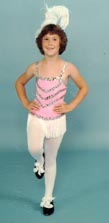
At eight years old, I was more of a tomboy than anything else. My bowl haircut made me look like a mushroom. A frown on my face, dressed in Levi jeans and an oversized He Man T-shirt, I looked identical to my older brother. Hanging out at my brother's soccer and lacrosse practices, I wanted so badly to be able to play with them.
"Kristin, for the last time, you can't play with the boys. They are bigger than you and I can't afford for you to get hurt," my dad always told me.
To expand my horizons and make me a bit more graceful, my parents enrolled me in dance classes. Claire, my best friend at the time, was in those dance classes with me. Every Tuesday and Thursday, we would go to ballet, tap and jazz together. At first I didn't like the idea, but I learned to enjoy those afternoons.
Especially when we got our white tights, shiny, black tap shoes and new zebra-striped leotards. During that class, we practiced hard for the upcoming weekend recital. Coming home, I pranced all over the living room, showing off my new clothes. I wanted the world to see them.
On the way home, Claire asked me to ride bikes to meet her father at the creek. The thought of riding through the streets in my polished shoes and lightning-white tights made my heart skip a beat.
I remember my mother's exact words when I asked her if I could go. "You can go. But no matter what you do, you'd better not rip those new tights, young lady."
At this point in the story, I caught my father giving my mother a knowing look. My mother glanced at me. Embarrassed, I stared at the blue, floral table cloth as I continued.
Like an excited puppy, I ran out of the house. Hopping on my bike, I met Claire on the corner. She and I rode furiously, shouting and screaming so that the neighbors would look out of their windows and see our new outfits.
We reached the top of the hill that led down to the creek. In my eight-year-old mind, this hill was a mountain. Standing at the top, I was petrified.
There I stood, wondering if Claire had seen the ski slope in front of us. But she raced down the hill without a care in the world. She looked back as if wondering why I hadn't moved yet.
Then, in a burst of competitive energy, I took off. If Claire could do it, then so could I.
My father let out a chuckle. As I looked around the table, I saw smirks on every face. Growing up, I thought I was invincible, and I still have the competitiveness of my childhood. Eric and I had played a ruthless game of basketball the year before, and he was still bitter about my victory. Chris was still getting over my beating him at ping-pong before dinner. Everyone knew my competitive drive.
What surprised me was that they were not just listening to my story but enjoying it.
The Decline
As I started down the hill, everything was fine. I was picking up good speed. My new tights made it easy for me to pedal. But soon I had too much speed. The handle bars shook; the pedals spun without my help. When I spotted a rock in my path, I couldn't swerve or hit the brakes.
I hit that boulder and my bike buckled forward. Sailing over the handle bars, I left my bike far behind. From the docks, Claire's parents witnessed two mid-air flips. While I soared, the water, Claire, the clubhouse and the boats interchanged like parts in a moving kaleidoscope. After scraping every inch of my body in a 15-foot slide, I landed flat on my back.
With the wind knocked out of me, I stared into the sky, choking for air. I caught my breath. Tears rolled. Turning my strained neck up the hill, I saw my mangled bike looking much like my crumpled body.
Blood was seeping through my brand-new tights. The once-white cloth was now spotted with red. My leotard was torn. Barely able to show my distorted reflection, my tap shoes were ruined.
Claire's mother drove me home as I laid in her father's arms like a frightened kitten. I rode home in his lap, wishing it was my own father who was holding me. All I could think about were my mother's last words to me: "You better not rip those tights, young lady."
I shook trembling on the front step as Claire rang the doorbell.
"What happened?" Mom cried as she ran out.
As Claire's parents explained what they had seen, my mom struggled to recognize her daughter under a mask of blood and gravel.
"Please don't be mad at me, Mom. I didn't mean to hit that rock," I mumbled through tears. "I'm sorry I ripped my new tights. I will pay for a new pair with my allowance."
"Oh honey, don't worry. It will be just fine," said my mother as she took me up to her bathroom and cleaned my wounds.
As I told my story, my mother's blue eyes shone just as they had that day in the bathroom. She had said then that everything would be fine, and it had been.
Getting It
What an effect that old story had now!
My grandfather grinned. My grandmother shook her head. My father laughed, small tears forming in his eyes. Everyone else was laughing so no one noticed the shiny gloss. It is true that he could have been teary because he was laughing so hard. I think there was more to it.
In hearing the story, he caught glimpses of his little girl. Looking at me now, he found it wonderful that I had grown before his eyes into a successful young woman. At the same time, he found it hard to let those Daddy's-little-girl memories go.
Leaning on the sturdy table, instead of devouring Grandma's infamous apple pie, I chewed slowly, digested properly and listened intently to the familiar story about Uncle Harry putting French fries up his nose.
David was bugging Aunt Diane to be excused from the table, just as I used to. But one year he would tell a story about his own bike wreck, and then he would learn what table talk was about.
Kristin Hagert, NBT's 1999 summer intern, is a junior journalism student and Division I lacrosse player at Loyola College in Baltimore.
When I Was a Reindeer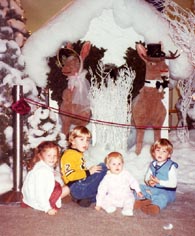
by Shirley Brewer
The classified ad appealed to drama students: "Be the voice of the talking reindeer!"
Surely I was an ideal candidate, a speech therapist who talked to children for a living. The challenge of this part-time job at the former Hutzler's Department Store in Glen Burnie would be to assume a reindeer personality. It seemed a fun way to make some extra money for Christmas presents.
I passed my reindeer interview with the ease of a sleigh gliding on snow. As I recall, there wasn't exactly a lengthy line of candidates.
The next step: mandatory attendance at reindeer training school on the top floor of the old Hutzler's store in downtown Baltimore, where the deer lived off-season. In that dusty attic, I learned the intricacies of the job.
I would sit in a tiny silver frosted house and manipulate handles that controlled the reindeer's head and opened their mouths. The reindeer, two lovely creatures, would stand in front of the house. I would speak into a microphone, communicating with children and shoppers and helping spread holiday cheer.
I would use two different voices, my own for Tinsel and a deeper one for Beau. Each shift would last two hours. It sounded simple. I left my training session exuding confidence and humming carols.
This poem recalls my first night on the job.
Reality ricochets like the acoustics
in this confining reindeer hut.
Every five seconds
the microphone malfunctions.
My vocal cords feel
like roasted chestnuts.
There's a charley horse in my Adam's apple.
Let me out of here!
Who needs minimum wage?
My name is Teresa,
I'm five years old.
I want a vacuum cleaner for Christmas.
Here's a song for you, Tinsel and Beau:
"Jesus, Myyyyy Lord "
Where's your price tag?
I want to buy you and put you in my house
Who cuts your hair?
"JeSUS, MY Lord "
The reindeer rehearsals emphasized
I should avoid controversial themes,
especially religion
and excessive sentiment.
Where is this child's mother?
I need a drink of water
Is my shift over?
One more hour:
I'll never make it.
Tinsel, it's Teresa.
My favorite color is purple and yellow,
I have four dollars in my piggy bank.
Why is your eye closed?
Does it hurt?
Do you want me to put a band-aid on it?
See: I've got a boo-boo on my knee.
We both have boo-boos!
And I have the blue-blues.
Teresa, let's sing "Santa Claus is Coming to Town":
"You better watch out "
My reindeer pressure reaches antler level.
"JESUS, My LOOORD "
This Christmas coop is hot as cocoa.
Why doesn't someone
remove the midget evangelist?
Shouldn't I be shopping?
Beau, do you have any babies?
I like spaghetti but not the sauce
"Jee SUS "
I love you, reindeers.
Retrospect recalls tender challenges,
scripts tossed aside,
a miracle
softening the spirit.
Teresa, we love you too,
Tinsel, Beau and me.
Finish your song,
we'll hum along.
It's all true, says Brewer of Pasadena, who kept a journal during the month of December, 1982.
My Christmas Cake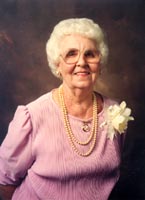
by Dorothy Hamblin,
submitted by Barbara Sturgell
Dorothy Hamblin wrote of her Christmas
Cake little more than a year before she died in 1998.
One of my best Christmases I remember was when I was a little girl and my papa moved the family from Hazard, Tennessee, to Stanford to get work and left most of our furniture in storage at Hazard. Times wasn't easy that year. He had already told us Christmas would not be much.
Then, one or two days before Christmas, we met the train that came from Jellico. My Granddad Sam Hackler and Mammy Hackler had sent us Christmas dinner and all the trimmings: a big, fat hen, oranges, apples - and my eyes got real big when I saw this big white cake with lots of little redhots all over it.
Every year at Christmas time I bake a white cake with little redhots all over it. My kids ask me, "Mom, why do you bake a white cake with redhots on it? Nobody eats the cake, just the redhots."
Then, one Christmas I told my kids why we still have a white cake with redhots at Christmas every year.
This memory of a favorite Christmas was written by my mother in 1997, as part of an adult education class she was teaching. I lost my mother to cancer in early 1998, but that white cake with the redhots remains my most cherished memory of Christmas while growing up in eastern Tennessee. It reminds me constantly to be thankful for my family and life here in Southern Maryland.
-Barbara Sturgell is well known throughout Southern Maryland as the proprietor of Happy Harbor in Deale.
A Newcomer's Christmas
by Tom Gill
My favorite Christmas story was told me by my wife's brother Frank, when we visited him in Melbourne, Australia.
Frank and his family left Burma, now called Myanmar, to escape the oppressive military government. At that time, his three children were in elementary school, and Frank, an articled accountant - equivalent to our CPA - was penniless.
As soon as he arrived, he applied for a job he saw advertised in the paper. Frank wondered how he would be received, as Australia then had a very racist image and he has a very dark skin. The people at the firm said he was overqualified for their job but suggested a job for which he seemed well qualified at the Boy Scouts of Australia.
Frank thanked them and, after a few phone calls, was invited to the Boy Scouts for an interview. It went well; they told him they would let him know the next day.
They did: He received a telegram in the morning stating that he had the job. Could he come in right away?
It was December 23.
When Frank arrived at the office, they had three presents for his children and they sent him home with the office tree.
Frank still gets emotional when he tells what he calls the story of his best Christmas ever.
-Tom Gill of North Beach is familiar to NBT readers as a contributor of letters to the editor.
Waiting for Santa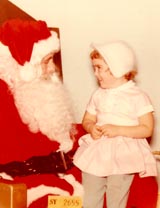
by Rosemary P. Leonard
Young Rose Leonard and Santa.
I am four years old. I am looking out the window at big snow flakes falling on a foot of snow. The plastic candle with the orange light in my window is pretty.
I am waiting for Santa.
Grammy has already sneaked downstairs to put up the Christmas tree after she told Poppa he couldn't have one. She does that every year. It's a big joke.
This year, she's hung it upside down in the bay window. It has white lights and all red balls. My grandmother is very artistic.
Poppa took me to Highlandtown to buy presents. He knows everybody. After shopping, we went to church. He knows every Catholic church in the whole city.
I wore my new coat with the leggings and fur collar. On the way home, we drove through Hampden to look at all the decorations.
I hear a noise. I look around the corner downstairs and see my Poppa's picture hanging over the mantle.
I run back to bed and go to sleep.
My Santa is here already.
-Rose Leonard, of Mason's Beach, had a "marvelous time" writing her Christmas story because she "was four years old again."
Christmas in Annapolis
by Emily Holland Peake
How well I remember Christmas in Annapolis in the 1930s and '40s. In those far-off days, the holiday season seemed always to be cold. Temperatures would be in the 30s and 40s, too, and everyone would be wrapped up in their warmest clothes.
There was a real farmers' market downtown, where the farmers would come and set up their stands in the weeks before Christmas, selling Christmas greens: trees, holly, homemade wreaths and running cedar. Just before Christmas, some of the country women would accompany their husbands, bringing their own real homemade mincemeat for pies, dressed turkeys, geese, chickens and eggs, sometimes handmade aprons and other fancy items for the house. In this way, they would make money for the Christmas presents they wanted to buy for their families.
Christmas trees, cut on the nearby farms, would be offered from early December until Christmas Eve. The tree merchants stacked their trees around City Dock. After dark, electric light bulbs would keep their stands visible to shoppers until late in the evening. The men would wear their big heavy wool coats, on their heads woolen caps that came down over their ears, woolen gloves on their hands and big boots on their feet, which they would constantly stamp as they stood around waiting for customers to make their selection.
Shoppers could look around for just the right tree for their house. Many people brought the tree every year from the same man, so they would always talk to one another. Inquiries about children, parents and wives were part of Christmas tree deals for these people. Many regular buyers looked forward annually to haggling with the tree merchant over price.
Over on the corner in front of Murphy's stood the Salvation Army kettle and the lady dressed in her uniform with the black ruffled bonnet that tied in a big bow under her chin. Wearing sturdy low-heeled oxfords on her feet, she would stand ringing the bell. Ding dong went the bell, signaling to passersby that they should put some of their spare change into the kettle to help those less fortunate than they.
Store windows were decorated for Christmas. Gift suggestions would be displayed in open boxes tied with red or green ribbons. McCready's and Hopkins Furniture companies opposite one another on lower Main Street filled their show windows with large toys: wagons for boys; doll carriages for girls; bikes and tricycles for large and small girls and boys; toy automobiles for junior drivers and Shirley Temple dolls for little mothers. Show windows were a wonderland for children in those days.
-Retired Riva postmaster Emily Peake grew up in Annapolis. She now teaches seniors how to capture their memories. Burnett & Fasick wrote their stories for her class.
Getting to Christmas
by Howard Burnett
During my youthful years, our family would gather for Christmas in Oneonta, New York, at the home of Uncle Alex and Aunt Marge. In the late 1930s and the war years, cars were not the chosen way to go that far - 170 miles from New Jersey - in the winter, so we traveled by bus and train.
In the 1930s, we took a local bus into New York City, then the subway to the Greyhound terminal for a bus bound for Kingston. There, we changed to a much smaller bus, really a limousine with a lot of seats, for the ride through the Catskills.
Usually there was snow on the ground, and those old buses, especially the Greyhound pup - were cold. Blankets were furnished. Everybody had a good laugh when an older man offered my mother some extra blanket, saying he didn't need it but on one side, anyway, as he had a wooden leg.
In the 1940s, we went by train. The Empire State Express to Albany was a big streamlined silver train, and I was impressed. Electric engines moved the trains out of New York City to reduce the smoke and soot. Then steam engines took over. Trains were always crowded during those World War II days.
It took the better part of a day to get to Christmas.
Childhood Christmas
by Pauline Fasick
I came from a family of 11 children. We lived in an old farmhouse in West Virginia. We were very poor, and there was never any money for toys. My mother ordered a gallon bucket of mixed candy from the Sears Roebuck catalogue, and on Christmas Eve, she would divide it up among us children. We never fought over one getting more than another, so I guess she divided it equally.
I got my first toy when I was about 10 years old. My older sister went to work for a family, and for Christmas she bought my sister Josephine and me little colored doll babies. They were really cute with pigtails and little pink dresses. We had never seen a colored person. We just thought they were little white doll babies with painted faces.
Everything we played with was homemade. My mother made a checkerboard out of cardboard. She split large dried beans for checkers pieces on one side of the board, and we used dried corn on the other. We played for hours and hours. We also made our own sleds and got in lots of accidents with each other because there wasn't any way to guide them.
When it snowed, we made snow ice cream out of snow, cocoa, sugar and milk. It would freeze your brain, but we loved it. My mother would make big sugar cookies from a magic recipe she had in her head. She never owned a cookbook in her life.
We never hung stockings or put up a Christmas tree. There was never any discussion about Jesus or Santa Claus. We learned about those things from school. We always knew Santa Claus wouldn't be coming to our house.
Our Shining Christmas Angel
by Jane Campbell-Chamblis
My husband and I have no children and really never saw the excitement of the season. We have always been sailors and love the water. So about 11 years ago, we decided to attend the Eastport Yacht Club Lights Parade.
Christmas has never been the same since.
We joined the parade, creating a gift for the city of Annapolis: a 40-foot-high by 38-feet-wide angel to light the city each year with 10,000 lights.
We wanted creating our angel to be a daytime family event. So we decorate at Ego Alley, and people walking down the street stop to lend a hand. Ours is a real angel who serves hot cider, cookies and music. She has little goodies up her sleeve and entertains the children.
About 5pm parade night, we light her up for the people to see. The children's faces light up also.
At 5:45pm, the lights go off as we leave City Dock for the parade. When the parade starting gun fires at 6pm the lights again shine. People just roar with delight: What a night!
Our friends for the past 11 years have been loyal and hardy folk who brave the cold, snow, wind and rain to give our city this Christmas present.
This year, we also shared our angel with Kent Island and Baltimore for their parades of lighted boats.
We've won Best in Parade and most of the first prize awards, including People's Choice. But the greatest award we receive is knowing we help bring joy to the season.
Our Shared Santa
by Linda Abbott
Husband-to-be Dennis, pictured with younger
brother Tom, and wife Linda, believe they met at Santa's knee.
Every Christmas among our Christmas decorations I hang photos of my husband and myself as children sitting separately on Santa's lap. Last year, after 22 years, I got a surprise. With a photo in each hand, I noticed a strange similarity. "Dennis," I said, "I think this is the same Santa."
"Look at his nose. He's got that chiseled nose and the same crease in his hat," Dennis said.
Under the magnifying glass, we even saw the same wedding ring.
I was nearly 2 in my picture, and Dennis 6; his brother Tom, also in the picture, is 3. So I tell my husband our marriage was fated since we met 50 years ago in the line to sit on Santa's lap.
Probably at Hecht's Department Store in Washington, D.C., added my mother, Jean Sullivan, of Prince Frederick. It was a yearly tradition, piling my sister, cousins and neighbors in the car for the trip downtown. First we'd look at the decorated windows; then we'd see Santa.
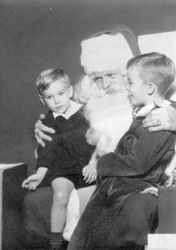
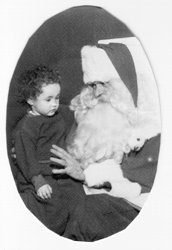
-Linda Abbott and her husband Dennis live in Deale Beach.
First Christmas Date
by Christopher Heagy
I still remember the first time Keri asked me out. Standing at my locker after school, I was in no hurry. Practice started in half an hour. She came out of nowhere, but there we were, in the middle of the chaos that is high school after the final bell rings.
"Chris, do you want to go to the dance together?"
With all the high school senior cool I could muster I said, "Uh, I don't know. But, uhh, hey, let's go out Friday night and see how things go."
I was 17, she was 16, and it wasn't always easy. We were both trying to learn the rules and figure what this dating thing was about.
That was three months before.
By Christmas time, the dance had come and gone and we'd been hanging out with each other ever since.
Now at Christmas, Keri and her family were going to Connecticut to visit her grandfather. I was staying at home with my family. So Friday was our Christmas together.
Keri worked late at the ice rink that night. I picked her up and we went to a party in my neighborhood, with a bunch of friends who had just returned from their first semester at college. Keri was the girl they all wanted to date but never had. Now she was here with me, a high school senior.
I was sitting on the floor, Keri was on a cushy living room chair right above me, in the middle of a party, two days before Christmas. I looked up and Keri bent over to make a joke. Her thick brown hair fell over and covered both our faces. Hidden behind a waterfall of hair, she smiled, we both laughed and she gave me a quick kiss and held her stare. I tried to pull my stomach out of my throat.
We left early that night. In my car, outside her house I handed Keri a Christmas gift. The box was sad, wrapped sloppily, folded thick around the edges. I could never wrap those tight, crisp packages like my mother's. But Keri thought it was cute and didn't want to see it ripped apart.
If the wrapping was bad, the gift was even worse. I had never shopped for a girl before. I wanted a gift that would show her how I felt and that could say the things I couldn't. But I wasn't sure how I felt.
I never figured out what to get her.
I settled on a bright yellow and blue flannel shirt. It was so ugly. I don't think she ever wore it. On top of the shirt was a Santa Claus Pez dispenser and my senior class picture.
I was bad at giving gifts.
But she gave me that smile and said she loved everything, and I let myself believe her.
We spent the next few hours together in my 1980 Chevy Malibu. I drove home that night with her smell on my clothes, in my car and swirling through my head. I laid in bed that night and I couldn't explain why I felt so weird.
It's been eight years since that night two days before Christmas, but I'm still glad I have that Christmas to remember.
| Issue 51 |
Volume VII Number 51
December 23-29, 1999
New Bay Times
| Homepage |
| Back to Archives |